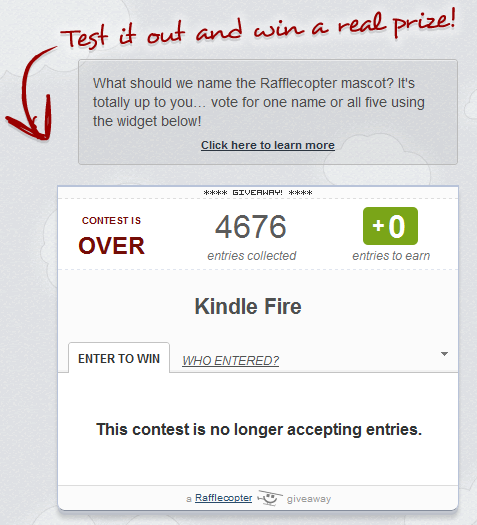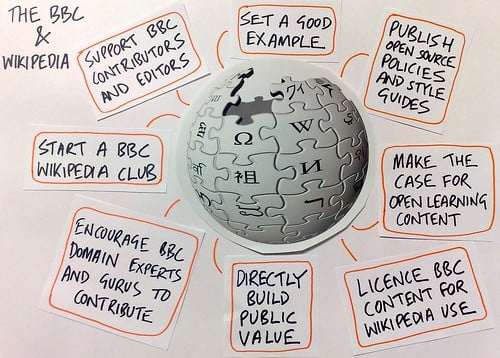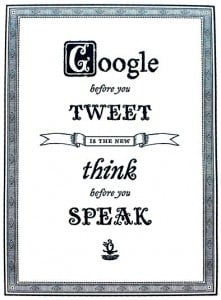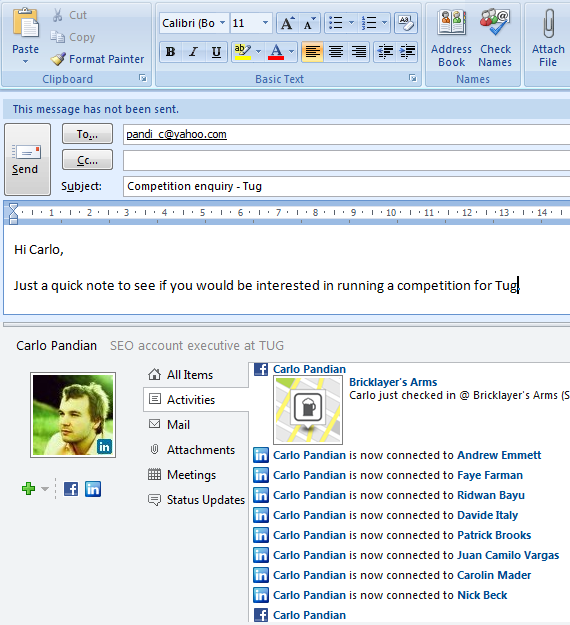Organising a competition can help you retain your new visitors and drive more traffic. Nowadays many companies give away products to bloggers so you would be able to get some goodies for free, here are some steps to kick out your first one:
1) Check for bloggers that are hosting competitions
You need to look for companies that have previously ran competitions. Perform a query in Google such as [“competition” beauty] or [“win” tickets] and you will find many bloggers being involved. Feel free to add other search operators such as [ inurl: ] (ex. inurl:blogsport, inurl:blog, inurl:.co.uk) or [ intitle: ] that search in the pages’titles. Moreover you could have a look at competition websites like competitionhunter.com or loquax.co.uk.
2) Get in touch with PR and marketing agencies
Ask the bloggers you have found to provide you with contacts of marketing and PR agencies that are promoting competitions and ask them to collaborate.
3) Write a competition blog post
Usually you will have to follow the guidelines provided to write copy that respects your giveaway branding guidelines. To select a winner and obtain data from your participants, use Rafflecopter, a widget that doesn’t require any coding skills. You have just to sign up in their website and follow the simple steps. At the end they will provide you with a code to copy and paste into the post.
4) Use the social networks
Promote the competition on Twitter and Facebook. In particular use hash tags such as #competition #giveaway and #free on Twitter and publish a status update on Facebook.
Ask your close friends to share your messages in order to amplify the reach.
How do you organise competitions? Share your tips and trick with other bloggers in the comments!
 The 30-minute film to raise public awareness of the crimes of Ugandan warlord Joseph Kony and secure his arrest has been shared more than five million times this week.
The 30-minute film to raise public awareness of the crimes of Ugandan warlord Joseph Kony and secure his arrest has been shared more than five million times this week.
“Kony 2012” was funded by a campaign group called Invisible Children and directed by Jason Russell, one of its founders. It has far outstripped other ads in the viral chart in terms of shares, with 5.35 million Facebook shares and 3,277 blog posts.
Just to compare, last week’s most shared ad, M&M’s Super Bowl effort “sexy and I know it”, managed 457,786 shares in four weeks and this week’s second most shared, Mercedes’ “invisible”, has recorded 118,392 shares in the past seven days.
Invisible Children also wants to engage 20 “culturemakers”, including Rihanna and Mark Zuckerberg, and 12 policymakers, including Bill Clinton and George W Bush, to persuade people to send the cause messages of support.
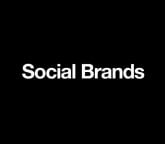
Tug attended “Social Brands 2012” to hear what the big companies such as the BBC, 02 and the Red Cross had to say about using social media.
The point that everyone agreed on from the offset is that Media Organisations do social media best. They are the leaders at content production and distribution so a natural fit with social media. To find the best practise in social media campaigns, watch news organisations social channels as they are the natural leaders in the social space.
As a result, brands are now looking to replicate news distribution and build “newsrooms” in-house to develop content and distribute across multiple media channels (Press, online, social media).
Bowling vs Pinball
James Warran, Chief Creative Officer Digital at Weber Shandwick talked about how the Bowling vs Pinball analogy neatly explains the traditional marketing model vs social media marketing model.
Previously marketers would prepare a large “bowling ball” (content idea), line it up and knock down as many pins as possible, however with social media marketers are firing pinballs (small content ideas) that are quicker and in constant need of supervision to ensure they gain enough points! Equally, if a ball drops out of play it is much easier to launch another and become smarter about keeping it in play.
Content is still King
An insight from 02’s Head of Social Media– people tweet about products (specifically theirs) freely online, it is up to the brand to choose points of engagement but should remember that the brand is not the core focus, the friend is, the reason they are telling the friend about the brand is because they like the friend, not the brand! Engagement has to be this narrative, and often it struggles not to be intrusive.
An insight from the Editorial Manager at the Red Cross was that content on social media needs to be in the moment of creation. It is no good having a social media manager sat in an office tweeting about an event. They need to be out there, like a roving reporter to become reactive providing on-the-scene blog posts and insights in order to really engage the social media community they are messaging towards.
Sophie Brendal, Head of Digital Engagement at the BBC gave her top three tips for community management of a social media profile: 1. Be personal 2. Be informative 3. Be attentive. Keep these three in mind in managing and generating content within your community.
Legal Eagles
Lastly, we caught up with Phil Sherrell, a Partner at Bird & Bird to discuss legal issues relating to social media marketing. He told us that the CAP Code is still the standard applicable framework for determining what is appropriate content etc.
However, the ASA are now monitoring all brand social media output and expect advertising that is submitted via Twitter to include the hashtag #ad – user generated content relating to the brand still carries copyright issues in public forums and that contact with co-authors is imperative before distributing. Blogs that distribute paid-for content need to state as such in the copy of the text.
Broadly, regulators and governments still playing catch-up with social media marketing regulations and legal issues, it is still the wild-west and individual fair usage policies on the social networks themselves e.g. Facebook Promotional Guidelines are still the most stringent forms of enforcement because they have the power to approve/ take down Pages and Apps!
To talk to Tug about social media drop me a line at ben.romberg@tugsearch.co.uk
Follow us on Twitter @tugagency
As most of us now know Facebook has launched Timeline. This is an important change for Brand Pages which is set to be implemented across all Pages as of March 30th 2012. There are 4 key profile changes that all brands need to consider before making the change over.
Luckily for our fine blog followers, Tug has put together a clear and concise slide show outlining our four key recommendations, enjoy!
Please tweet us @tugagency with any of your thoughts on Facebook Timeline!
So for those who are still wondering what the fuss is about, here is the Ultimate Guide to Pinterest … how the idea came about, what’s the big deal?, stats, facts and demographics, getting started and what people are pinning:
– Tone of voice
If you want your wiki to be approved, don’t be promotional in your content and ask yourself whether you are contributing or spamming the content? Read the page carefully so you can quickly understand what it talks about and if your entry can be useful for the community.
– Create a persona
Sign up to a new e-mail with no reference to your website or yourself. The wiki moderators assume the writers are independent, so you want it to appear that way.
– Search wiki pages
Google offers special term operators that can infiltrate the web and look for specific terms and urls, an example of first query can look like this: “product type” inurl:wiki or “brand name” inurl:wiki . “list of (your busineness type)” inurl:wiki (ex. “List of marketing agencies” inurl:wiki, “fancy dress” inurl:wiki ) . Brainstorm different opportunities looking at the page of your website. Recently I have built some links to the website of a factory in travel wikis because they have a factory museum to visit. Secondly I built other links in a page dedicated to a robbery in that factory.
– Add entries
Create an account for every wiki with your persona. After that you can usually edit the text with a specific syntax. A link is written as follows: [url anchor text] example:[http://www.bbc.co.uk BBC]. The best pages have moderators so try to be in line with their philosophy to get your contributions approved.
– Check your results
As you edit pages, save all your links in a spreadsheet and check in the future if your link gets approved. Do you have any suggestions to share for the community of link builders that allow us to improve our work? Leave a comment below
Microsoft has launched a great tool called Outlook Social Connector that can help you in different tasks (from online PR to sales) and boost your productivity. As soon you type an email address in the receiver form, the software enables you to check the social activity of the receiver . In particular it pulls out data available in two main social networks such as Facebook and LinkedIn so you can see the name of your contact and her/his conversations.
As sometimes I need to email hundreds of bloggers, this has helped me to craft bespoke emails and has saved me a large amount of time which I would have spent checking their profiles or searching for their real names. I am now tailoring better emails without wasting time and I am also increasing my connections on LinkedIn, the main platform for business purposes.
As people have lost their confidence with their privacy and have extended their personality online with public profiles, I bet this kind of tool will become more popular so early adopters, be aware!

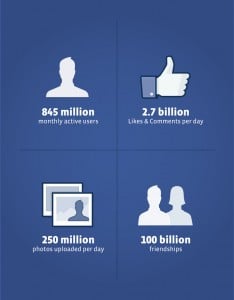 Mark Zuckerberg’s letter to investors following Facebook’s £5bn Initial Public Offering (IPO) – one of the largest in Wall Street’s history – reflects some big changes in the way the web has shifted towards being more “social” and how social networks have sought to monetise themselves.
Mark Zuckerberg’s letter to investors following Facebook’s £5bn Initial Public Offering (IPO) – one of the largest in Wall Street’s history – reflects some big changes in the way the web has shifted towards being more “social” and how social networks have sought to monetise themselves.
Below we have pulled out some key quotes from his letter that are worth checking out.
On Facebook as a business
“We don’t build services to make money; we make money to build better services.”
On Facebook and politics
“We believe that leaders will emerge across all countries who are pro-internet and fight for the rights of their people, including the right to share what they want and the right to access all information that people want to share with them.”
On Hackers
“The word “hacker” has an unfairly negative connotation from being portrayed in the media as people who break into computers. In reality, hacking just means building something quickly or testing the boundaries of what can be done. Like most things, it can be used for good or bad, but the vast majority of hackers I’ve met tend to be idealistic people who want to have a positive impact on the world.”
Hacker culture is also extremely open and meritocratic. Hackers believe that the best idea and implementation should always win – not the person who is best at lobbying for an idea or the person who manages the most people.”
Unofficial slogan?
“We have a saying: “Move fast and break things.”
Read the full letter here on engadget:
http://www.engadget.com/2012/02/01/zuckerberg-outlines-idealistic-facebook-mission-in-ipo-filing/

